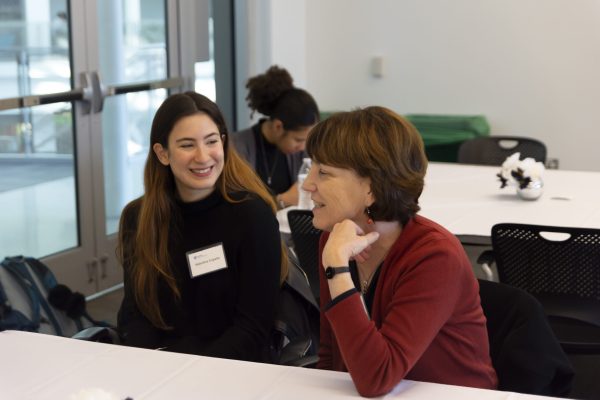The Liberal Arts Alumni Mentor Program connects current undergraduate students with an alumni mentor. Mentors help students navigate academic, professional, and extracurricular experiences.
The next cohort will be matched in the fall 2026 semester.

Understanding the Program
What is mentorship?
Mentorship is a process in which an experienced individual helps another person develop their goals and skills through on-going, supportive one-on-one conversations and learning exercises.
The role of the student mentee is to engage and participate in the process with their mentor to gain guidance around career development and exploration, goal setting, and decision making.
The role of the alumni mentor is to engage and participate in the process with their mentee by providing insight, guidance, and support based on personal experience in career and academic pursuits.
What will I get from this program?
You will gain a support network, beginning with your mentor, as you work together toward your career goals. This involves establishing meetings, identifying objectives, suggesting next steps, and asking for input. The more effort you put in, the more effort your mentor will put in. You should be meeting once a month, with meetings that last between thirty to sixty minutes.
If you take the right steps with your mentor, you will:
- Build effective relationships and networks
- Get guidance on making the most out of your education
- Find career exploration and development resources
- Hear different points of view and challenge yourself
- Enhance your ability to enter and grow in your internship/job
Participating in the Program
Meeting with your Mentor
Once you apply and are admitted into the program, the Liberal Arts Career Enrichment Network will assign you a mentor in LionLink. You’ll be required to reach out to your mentor over LionLink to introduce yourself. LionLink will provide you with a fillable email template to use. Make sure to edit it to match your specific situation and goals. Professional communication is a skill that you will use for the rest of your career, so it’s a great time to practice and develop it!
Suggested Activities
Phone and video chat have become increasingly popular among our alumni mentors. If this is what you and your mentor use, follow these guidelines:
- Find a quiet spot with good reception.
- You may be speaking to an administrative staff member before you are connected with your mentor. Introduce yourself and politely ask for your mentor.
- Keep it professional and come prepared with an agenda.
- Follow up with a thank you email.
Email is the preferred way for most alumni mentors to keep in touch. If this is what you and your mentors use, follow these guidelines:
- Acknowledge their email within twenty-four hours and respond to their email content within two to three days.
- Notify your mentor if other obligations affect your availability.
- Use your Penn State email address. This helps them identify you.
- Add a signature line to your email account to provide your contact information, just in case they need it in the future.
If you and your mentor are able to meet in person, follow these guidelines:
- Your mentor may be traveling to meet with you. Respect their time and arrive early.
- Try to meet somewhere quiet and relatively distraction-free.
- When you first meet them, shake their hand. A strong first impression is important.
At your first meeting, you and your mentor should complete the program agreement and the goals worksheet These are important steps in starting the mentorship on the right track. After that, you should get to know your mentor. Ask them any questions you have about their professional life, career, time at Penn State, or anything else you are curious about!
Here are some great conversation starters to ask during your first several meetings:
- How did you choose Penn State?
- What activities were you involved in?
- What is your favorite Penn State memory?
- If you were a Penn State student again, what would you do differently?
- Did you have a mentor? What experiences did you gain from this experience?
- What is your educational background?
- How did you get to where you are today?
- What jobs did you have previously?
- What was your first job out of college, and how did you get it?
- What keeps you busy outside of work?
- Do you have any hobbies?
- What was your biggest challenge moving from school into the work force?
- Why did you decide to give your time to be a mentor in this program?
- Do you hold any leadership roles within or outside of the organization you work for?
- What is a typical work day for you?
- What do you like most about your work?
- What is the biggest challenge of your job?
- What best prepared you for this job?
- What education, skills, and experiences are needed to enter your profession?
- What is the typical work environment like?
- What publications or professional associations are related to your field?
- Do you have any suggestions for internships, part-time jobs, or campus and community activities that would enhance my ability to obtain a position in your field?
- Would you mind reviewing my résumé?
- Where do you suggest I find a job or internship postings related to my field of interest (outside of Nittany Lion Careers)?
- Where can I find graduate or professional schools related to my interests?
- What other suggestions do you have?
For future meetings, you may need a few ideas for activities to complete when you meet with your mentor. Below are some ideas organized by values, interests, academics, and professional goals.
- Talk about your career goals or career ideas that you have.
- Shadow your mentor at work for a day.
- Talk about diversity, inclusion, and equity concerns/initiatives within your career field of interest.
- Discuss your interests, majors, minors, hobbies, activities, etc.
- Talk about student organizations and professional organizations in which you can become involved.
- Discuss research, volunteer work, or other activities in which you can get involved.
- Review class options for upcoming semesters and discuss possible major and minor choices.
- Discuss education abroad opportunities (study abroad, international internships and research, embedded courses, etc.).
- Talk with your mentor about other ways to get global experiences.
- Talk about the Paterno Fellows Program.
- Review your résumé and cover letter together. Get feedback and make edits.
- Ask your mentor to conduct a mock interview with you and share constructive feedback.
- Discuss best practices for professional workplace etiquette.
- Research internships and job opportunities.
Navigating Common Problems
Issue | Response |
|---|---|
The mentor is not responding to emails in a timely manner. | Remember, your mentor is a professional who has work and personal commitments outside of their volunteer work within this program. If your mentor does not respond to your message within one week of reaching out, try reaching out via email once more. If they still do not respond within forty-eight hours, email Dayna Wenger, the student and alumni relations coordinator, at dmh136@psu.edu. She will help you navigate this issue, and if need be, reach out to your mentor to verify their interest and availability of their time. |
You are not sure what you would like to do after college. | Take part in career exploration activities like CliftonStrengths®. Talk to your mentor about the co-curricular activities you have enjoyed while in high school or at Penn State. If appropriate, ask your mentor to introduce you to people in their network; this may lead to post-graduation ideas. |
Your career goals have changed since first joining the program. | This is completely normal! If this is the case, email Dayna Wenger, the student and alumni relations coordinator, at dmh136@psu.edu to discuss if being paired with a different mentor is appropriate. |
Pro Tip: Check your email!
The Liberal Arts Career Enrichment Network sends important information about the mentor program to your Penn State email address every month. You will find the Alumni Mentor Program Newsletter, surveys to talk about your mentee experience, and more.
Find a Resource
A conversation with your mentor may spark an interest in learning more about mental health and wellness, equity and inclusion, academic assistance, and more. Explore college and University resources.
What if I’m feeling overwhelmed?
This program is designed to bring meaning to both students and mentors, not add stress! There may be a way to stay active while balancing a busy schedule. In fact, one of the benefits of this program is that mentors and mentees determine the communication structure. We want to work with you to make this experience valuable.
You are also welcome to visit Dayna Wenger, the student and alumni relations coordinator. Office hours are available for students by appointment. Please schedule through Nittany Lion Careers.
Want to learn more about the role of a mentor?
Mentors receive similar information regarding participating in the program, suggested activities, navigating common problems, finding resources, and more. View the program information for mentors.
